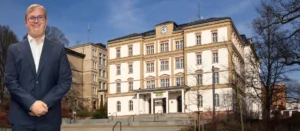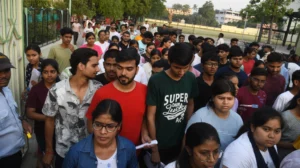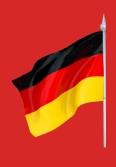Friedrich Ebert Stiftung (FES) Scholarship Programme is a boon for aspiring students in desperate need of allowances to meet their expenses.
Before we dive into the scholarship programme, let us have an understanding of the man behind the name and some of his life history.
Who was Friedrich Ebert?
Friedrich Ebert was born on 4th February 1871. He was the seventh child among nine siblings. His father’s name was Karl Ebert, and he was a tailor. Friedrich Ebert wanted to study at university, but they lacked the funds to enrol him in a university.
Early on, he took many odd jobs and travelled to many places. Louise Rump was his wife. Friedrich worked as a bar owner, where they held the socialist centre and union activities. They appointed him the party chairperson of the Bremen SPD. He emerged on the top slowly until he became the youngest member of the Parteivorstand (party executive).
He ran for a Parliament seat in Germany in 1898, 1902, and 1906. But he was unsuccessful. August Bebel died in 1912, and they appointed Ebert joint party chairperson at the Jena convention on 20th September 1912.
They held the first presidential election in Germany on 11th February 1919. They elected Ebert as the first provisional president of the Weimar Republic.
Friedrich Ebert was the first democratically elected head of state, commoner, social democrat, civilian, and the first person from an ordinary background.
Friedrich’s policy of balancing politics during the Weimar Republic was an important paradigm.
Friedrich Ebert Stiftung Scholarship Programme
During those times, talented children from socially weak backgrounds couldn’t study in universities or participate in research programmes.
The Friedrich Ebert Stiftung Foundation laid its foundation in 1925.
They gave the first-ever scholarships to talented young individuals who were proactive in the Weimar Republic democracy.
As of today, the SPD-associated Friedrich Ebert Stiftung Foundation is Germany’s largest and oldest affiliated foundation, promoting students with excellent intellectual knowledge and personality.
One of the primary goals of FES is to address all social problems by helping actively committed students to social democracy when working for justice, social harmony, and freedom.
 How can I avail this scholarship?
How can I avail this scholarship?
The FES believes that community service merits praise.
Therefore, the selection procedure takes into account the applicants’ social and political activity, as well as their attitudes, in addition to their academic accomplishments.
About 2,700 undergraduate and graduate students will receive grants from FES this year.
What if I do not belong to the EU? (International student)
Friedrich Ebert Stiftung also assists enrolled foreign applicants in German universities at the time of application or pursuing postgraduate studies there.
Every year, up to 40 students from Latin America, Africa, Asia, and Eastern Europe may be eligible for the scholarship programme, except for those already receiving financial aid from the government.
Supporting foreigners
The fundamental funding for foreigners is identical to the money for Germans in terms of content. You get financial assistance for a high-performance degree, a seminar programme that improves your social and professional skills, and individual help from about 470 respected lecturers in person.
They also encourage the recipients of foreign scholarships to engage outside the classroom, whether for their nation, Germany, or global causes. Since international students are unfamiliar with the social and cultural norms at their university, it is challenging for them to integrate into society.
FES university groups are particularly intriguing since they have relationships as a social endeavour in reality. The study financing office has established a buddy programme specifically for recently admitted refugees and recipients of foreign scholarships. Here, seasoned fellowship recipients can assist freshly accepted students and share details with them.
Former recipients of international scholarships are also useful contacts; they are simple to get in touch with through the online community and delightfully share their insights.
Doctoral funding
All benefits of doctoral funding are available to international scholarship recipients, including financial security, specialised contacts, networking in university organisations and working groups, and a robust seminar schedule.
Doctoral colloquia are events we provide where recent graduates can present and discuss their work. These seminars are a forum for PhD students to discuss world politics. International students’ perspectives are greatly welcome here where they learn more about contemporary social issues in German society simultaneously.
The time spent receiving PhD financing also facilitates cross-border networking: Graduates won’t have trouble finding relationships locally, in Germany, and globally, especially when returning home after graduation. Employees of FES are politically engaged in more than 100 nations. This network makes it easier to share new information and collaborate on growth.
Eligibility Criteria
| FES supports | FES does not support |
| All academic subjects | Study visits outside Germany |
| Postgraduate programme (PhD) | Second-degree courses |
| Public or state-approved university students | Postgraduate courses in medicine |
| University of Applied Sciences and polytechnical college students | The final phase of academic studies |
Important note: Only foreign applicants enrolled in a German university or who have a supervisor for their PhD studies are eligible for scholarships from Friedrich Ebert Stiftung.
German language proficiency
Before applying, students must reside in Germany and provide with a language competency certificate to confirm their fluency and command of the German language.
There are various tests that students can take up to prove their German language proficiency.
- Test of German as a Foreign Language (TestDAF)
According to the regulations of the German Rectors Conference (HRK), a minimum of level 4 (TDN 4) or higher in the Test of German as a Foreign Language (TestDAF) is the required standard for German language competencies in academic institutions.
Some courses like natural science, music, art, and engineering may accept a lower level (TDN 3) of German language proficiency.
- German Language Proficiency Test for German university admission (DSH)
The DSH comprises three levels overall. Level 2 is the eligibility for many German universities.
Medicine and dentistry degree courses might require a level 3.
Applicants can take the DSH test at most universities in Germany.
The syllabus for the DSH test can vary from one university to another, but the certificate will hold valid in all German universities.
- Goethe Certificate – C1
A C1 level Goethe certificate is an advanced language skill level.
The Common European Framework of Reference of Languages puts the C1 level at the fifth of the six-level competence scale.
Did you know that German language proficiency from Goethe is recognised worldwide?
Many German universities and higher education institutions recognise a C1 level German proficiency certificate as a language proficiency certificate for university admission.
Application deadline
Except for individuals enrolled in master’s or other postgraduate programmes, overseas students should provide documentation of their first academic accomplishments/marks at the time of application.
Even though the study programme is conducted in English, German language skills are essential because foreign scholarship recipients will receive a comprehensive social and political side course.
They only provide financial aid to international students from Asia, Africa, Latin America, and Eastern Europe—not Western European nations.
| Programme | Application deadline |
| Diploma | By the end of the 6th semester |
| Magister | By the end of the 6th semester |
| State examination | By the end of the 6th semester |
| Bachelor’s | If 6 semesters, then the end of 3rd semester. If 7 semesters, then the end of the 4th semester. |
| Undergraduate | If 6 semesters, then the end of 3rd Semester. If 7 semesters, the end of the 4th semester. |
| Postgraduate | By the end of the 1st semester |
| Master’s | By the end of the 1st semester |

Duration of the application process
The duration of this process can go from four to seven months. It depends on how early you begin the application process.
Mode of application
- Self-application.
You can register using the “Online Application” provided on the Internet.
- Individual Interviews.
They will invite selected candidates to two individual interviews as a second phase. One of the FES lecturers will conduct the first interview, and a member of the FES scholarship committee will conduct the second interview (AWA). These interviews will be the foundation for two reports written and delivered to the AWA.
- Discussion and the final decision by AWA
The AWA will ultimately decide whether to accept your application. AWA is a free-standing organisation comprised of university professors and other experts in science, politics, the arts, and the media. The committee holds at least three annual meetings. After an extensive discussion of each application, the AWA will make the ultimate decision.
- Final written notification
They will notify the candidate in the end about AWA’s decision.
Perks of the Friedrich Ebert Stiftung Programme
Foreign scholarship recipients get
- Monthly payments of €650 (basic scholarship programme) or €1000 (graduate scholarship programme)
- Doctoral scholarship holders receive 1,200 euros per month. The duration of the funding is two to three years. In justified exceptional cases, they can also grant funding for longer than three years, but no longer than the time of the final examination.
- If applicable, a family allowance of 276 euros.
- Reimbursement for medical expenses.
- They will deduct any monthly income over €400 from the scholarship.
What are the expectations of the Friedrich Ebert Stiftung Scholarship Programme?
Holders of FES scholarships should:
- routinely participate in the extracurricular activities and events that FES campus organisations host.
- perform better than average in their degree-related coursework.
- maintain and strengthen their commitment to social activism.
The applicant must submit a semester report outlining the scholarship holder’s present academic standing and social activity to FES at the end of each term.
You will now have a proper idea about the Friedrich Ebert Stiftung Scholarship Programme.
Kindly contact KCR CONSULTANTS to know more about scholarships and other details.
Please read our article about how to study in Germany for free to know more information about free education in Germany.

 How can I avail this scholarship?
How can I avail this scholarship?







